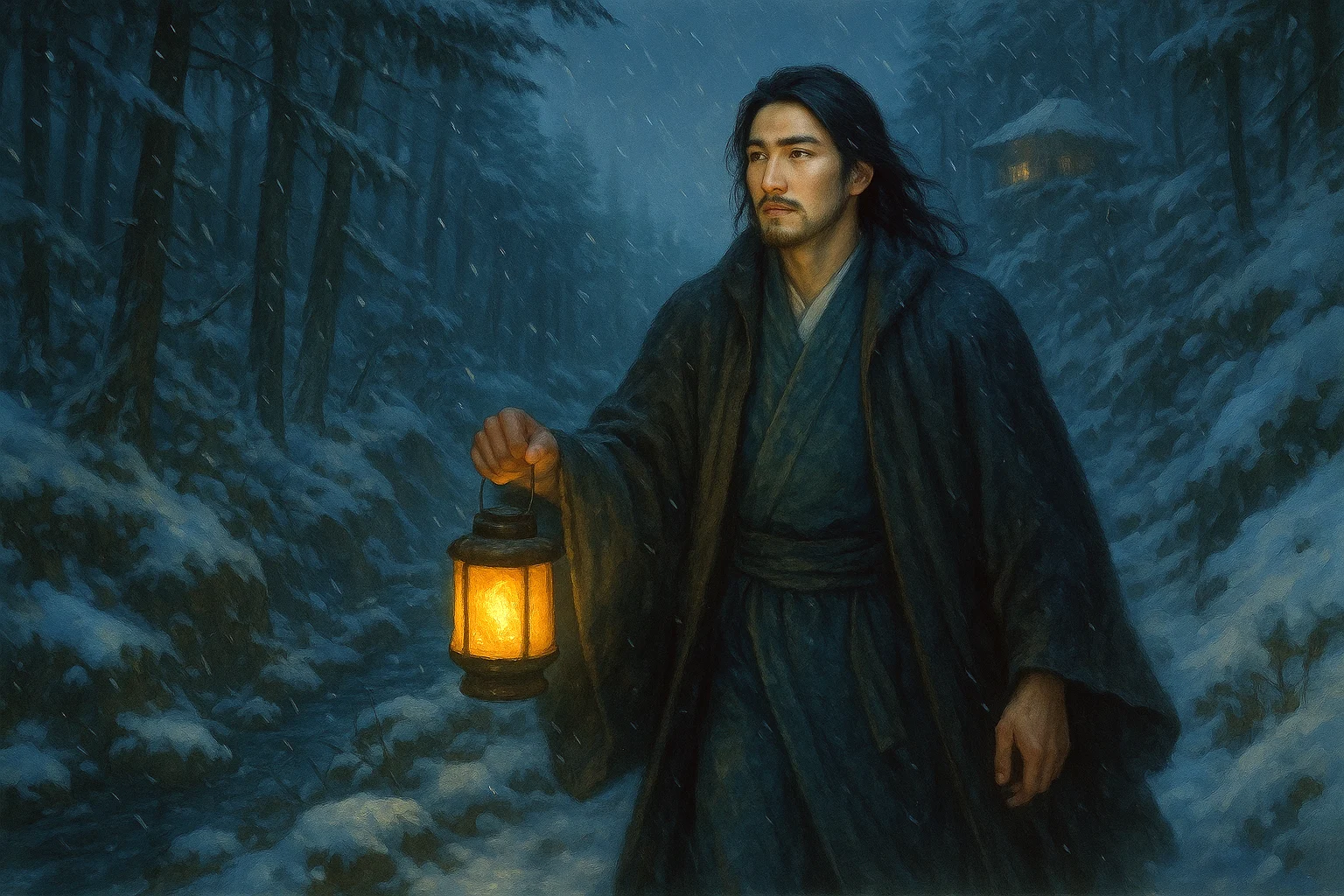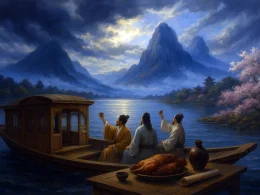Sad wanderer, once you conquered the South,
Commanding a hundred thousand men;
Today, dismissed and dispossessed,
In your old age you remember glory.
Once, when you stood, three borders were still;
Your dagger was the scale of life.
Now, watching the great rivers, the Jiang and the Han,
On their ways in the evening, where do you go?
Original Poem
「送李中丞归汉阳别业」
刘长卿
流落征南将, 曾驱十万师。
罢归无旧业, 老去恋明时。
独立三边静, 轻生一剑知。
茫茫江汉上, 日暮复何之。
Interpretation
Composed during the turbulent mid-to-late Tang period marked by incessant warfare and political instability, this farewell poem honors Li Zhongcheng - an aged, battle-hardened general now facing demotion or forced retirement. Having once commanded vast armies guarding southern frontiers, the veteran is returning to his modest Hanyang estate. The poet commemorates Li's military glory while lamenting his twilight obscurity, expressing profound sympathy for his loyalty and fate.
First Couplet: "流落征南将,曾驱十万师。"
Liúluò zhēng nán jiàng, céng qū shí wàn shī.
Now wanders the southern campaign's lord / Who once led a hundred thousand with sword
The stark opening contrast between present wandering and past command establishes the poem's elegiac tone. "A hundred thousand" (十万师) hyperbolizes the general's former might, making his current displacement more poignant.
Second Couplet: "罢归无旧业,老去恋明时。"
Bà guī wú jiù yè, lǎo qù liàn míng shí.
Dismissed, he owns no ancestral field / Aging, he yearns for just rule unrevealed
This couplet reveals the general's incorruptible character - returning without accumulated wealth, still longing for virtuous governance. The "just rule" (明时) implies criticism of current misgovernment through its absence.
Third Couplet: "独立三边静,轻生一剑知。"
Dúlì sān biān jìng, qīng shēng yī jiàn zhī.
Alone he pacified three frontiers vast / His life-light sword alone knows courage steadfast
The emotional core celebrates Li's solitary vigilance and death-defying valor. The anthropomorphized sword becomes sole witness to his bravery, suggesting official history's neglect. The parallel structure elevates personal sacrifice above institutional recognition.
Fourth Couplet: "茫茫江汉上,日暮复何之。"
Mángmáng Jiāng Hàn shàng, rìmù fù hé zhī.
On Yangtze-Han's expanse so wide / At sunset - where does his path now guide?
The conclusion's watery vastness and fading light symbolize uncertain destiny. The rhetorical question underscores the veteran's disorientation - having defended borders, he now lacks life's coordinates. The "sunset" (日暮) doubly signifies both daily and life-cycle closure.
Holistic Appreciation
The poem progresses through four historical planes: present displacement (I), ethical consistency (II), past heroism (III), and future uncertainty (IV). This structure transforms a personal farewell into a meditation on loyalty's paradox - how those who safeguard empires often become empire's casualties. The restrained anger simmers beneath classical allusions and natural imagery, achieving powerful indictment through understatement.
Artistic Merits
- Strategic Contrast: Juxtaposes numerical grandeur (100,000 troops) with solitary figures (one general, one sword)
- Symbolic Economy: "Three frontiers" represents entire border security; "life-light sword" condenses warrior ethos
- Temporal Layers: Simultaneously captures past glory, present injustice, and future obscurity
- Resonant Silence: The unanswered final question amplifies the poem's moral protest
Insights
This Tang-era poem speaks acutely to modern civil-military tensions and veterans' struggles. The general's plight mirrors contemporary dilemmas about how societies honor those who defend them. The work suggests true heroism exists beyond official recognition - in the sword's private testimony rather than public awards. Its closing image of a disoriented veteran on twilight waters remains painfully relevant for today's returning soldiers navigating civilian life. Ultimately, the poem challenges us to build societies where "just rule" includes proper care for those who secured it.
Poem translator
Kiang Kanghu
About the poet

Liu Zhangqing (刘长卿) was a native of Xian County, Hebei Province. He studied at Mt. Songshan when he was young, and later moved to Jiangxi, where he received his bachelor's degree in 733 A.D. He also belonged to the Wang and Meng school of poetry. His poems belonged to the school of Wang and Meng, and he was most famous for his five-character poems, and was also most conceited, once thinking that he was "the Great Wall of five-character poems", which meant that no one could surpass him.












